 A common sight in China: The bicycle traffic signal. (Let's hope they don't become a thing of the past with China's increasing car-owner population.)
A common sight in China: The bicycle traffic signal. (Let's hope they don't become a thing of the past with China's increasing car-owner population.)Wednesday, May 23, 2007
Wednesday, May 16, 2007
Anhui in Photos
Since I've waited a month to post something on my trip to rural Anhui, I'm going to stick to posting photos for now. I've tried a couple of times to write about the crazy, unexpected, exciting and down right funny things that happened on that trip, but every time I sit down to write I don't have enough time to do it any justice.
Xikou, Anhui -- the base of operations for a weekend in the sticks -- your average, dusty, small town in China, population 20,000.
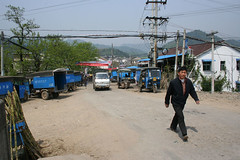
Xikou is famous for its green tea, which was being sold by the pile in a market right underneath the window of the room I slept in. I can say with authority that the market opens at around 3 a.m. with lots of honking, yelling and bell ringing.
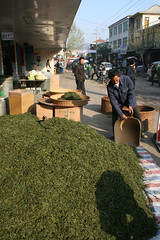
One afternoon I started wandering around the old part of Xikou (what self-respecting Chinese town doesn't have a new "developing" portion with buildings decorated in fake Greek-like columns?). It reminded me somewhat of the old west -- and I love the hand-painted signs on every building.

After a stop at the opening ceremony for Xikou's "Tea Culture" Festival, we stopped by the local school to meet up with our host's family. My camera was spotted by a large group of drum-beating girls, who were very excited to have their pictures taken.

Our host, Xiao Wei, introduced us to his family, who let us stay in their homes for the weekend and were all around wonderful hosts. Behind the two kids is Lao Yezi, Xiao Wei's father.

I traveled to Xikou with my friend Eliot, fellow Nanjing resident and NYU alum. While we were in Xikou, some of the English teachers asked us to speak to their classes. Apparently their town doesn't get many foreigners passing through. The kids were nervous, but there was one hillarious kid up front who kept blurting out random English phrases like, "I'm 40 years old!"


On our second day in Anhui, Xiao Wei and his friends took us out into the wilderness to climb a mountain. Because I've been in China for a while I was expecting stairs and lots of tourists. But I was pleasantly surprised by our rough drive over a river bed to the base of the mountain. I knew that without a road it was pretty much guaranteed that hoards of tourists and their bull horn equipped tour guides would be no where in sight.
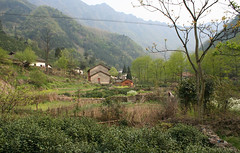
The climb was pretty rough, but we took breaks on the way.
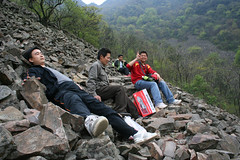
At the top of the mountain was a magnificent view...

and a monastery.
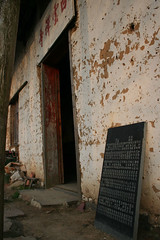
We spent the night in the monastery and woke up early for a sunrise that never materialized because of fog.


We talked to this old monk who told us the story of the monastery's fate. He told us that the temple, which was once made of iron, was dismantled during the Great Leap Forward. Xiao Wei promised to help the monk by writing a letter to the government asking for compensation for the iron.

We started our trek early and got back to Xikou in time for one last lunch with Xiao Wei's family and friends.

Xikou, Anhui -- the base of operations for a weekend in the sticks -- your average, dusty, small town in China, population 20,000.

Xikou is famous for its green tea, which was being sold by the pile in a market right underneath the window of the room I slept in. I can say with authority that the market opens at around 3 a.m. with lots of honking, yelling and bell ringing.

One afternoon I started wandering around the old part of Xikou (what self-respecting Chinese town doesn't have a new "developing" portion with buildings decorated in fake Greek-like columns?). It reminded me somewhat of the old west -- and I love the hand-painted signs on every building.

After a stop at the opening ceremony for Xikou's "Tea Culture" Festival, we stopped by the local school to meet up with our host's family. My camera was spotted by a large group of drum-beating girls, who were very excited to have their pictures taken.

Our host, Xiao Wei, introduced us to his family, who let us stay in their homes for the weekend and were all around wonderful hosts. Behind the two kids is Lao Yezi, Xiao Wei's father.

I traveled to Xikou with my friend Eliot, fellow Nanjing resident and NYU alum. While we were in Xikou, some of the English teachers asked us to speak to their classes. Apparently their town doesn't get many foreigners passing through. The kids were nervous, but there was one hillarious kid up front who kept blurting out random English phrases like, "I'm 40 years old!"


On our second day in Anhui, Xiao Wei and his friends took us out into the wilderness to climb a mountain. Because I've been in China for a while I was expecting stairs and lots of tourists. But I was pleasantly surprised by our rough drive over a river bed to the base of the mountain. I knew that without a road it was pretty much guaranteed that hoards of tourists and their bull horn equipped tour guides would be no where in sight.

The climb was pretty rough, but we took breaks on the way.

At the top of the mountain was a magnificent view...

and a monastery.

We spent the night in the monastery and woke up early for a sunrise that never materialized because of fog.


We talked to this old monk who told us the story of the monastery's fate. He told us that the temple, which was once made of iron, was dismantled during the Great Leap Forward. Xiao Wei promised to help the monk by writing a letter to the government asking for compensation for the iron.

We started our trek early and got back to Xikou in time for one last lunch with Xiao Wei's family and friends.

Tuesday, May 15, 2007
Dateline: Pasadena, Calif. (or is that Mumbai, India?)
When fears arose a few years ago that journalism jobs would start to be outsourced to India, I thought it was the craziest thing I had ever heard. How could a guy in Mumbai report on the minutia of local politics in the United States? But, as seemingly crazy things tend to do, it became a reality, and it doesn't look like it's going to let up any time soon.
At the end of 2005 Reuters had already set up a 1,000+ media workforce in Bangalore, India that reports on Wall Street. Information about Wall Street aside -- after all, stock quotes can be analyzed as quickly on the other side of the globe thanks to our friend, technology -- I've still been skeptical that the trend would worm its way into local journalism.
But in a recent post in Information Week, blogger Richard Martin writes about PasadenaNow.com, which recently outsourced its city council reporting beat to two journalists in India.
So why is this happening? I think there are two reasons.
The first is obvious, it's the reason for outsourcing in all industries: cheap labor. The Indian journalists' combined salary is less than $20,000 a year -- a real coup for a local news organization that is probably like most local news organizations in the U.S. Local news organizations as I know them have one major goal: to constantly increase their already high profit margins (most U.S. newspapers make rake in a 20 to 30 percent profit margin as it is). One starting reporter at a small community newspaper makes all of $20,000 a year in more markets than most people would believe. Of course, as reporters gain experience, move onto bigger papers, or gain seniority, their salary increases some what. Either way, two reporters for the price of one starting reporter most likely has accountants in the media industry salivating. And with recent industry trends -- falling circulation, falling ad sales, reader traffic moving to the web, which most news companies have yet to find a way to make profitable -- outsourcing reporters must seem like a great way to keep profit margins high.
The second reason is less, well, nice: U.S. journalists are getting lazy. I know, I've been there, and I'm just as guilty as the next person of lazy reporting. We reporters make excuses for our lazy reporting -- being overworked, a small staff, no overtime budget. These reasons are valid, and I know writing ten or more stories a week will make anyone want to dash a few stories off without proofreading or confirming facts. But when the most local of local reporting jobs, the bread-and-butter of beat reporting, gets outsourced to India, it should be a wake up call. Journalists should be taking a second look at their own work. If we were producing unbeatable, compelling stories, our work couldn't be outsourced.
At the end of 2005 Reuters had already set up a 1,000+ media workforce in Bangalore, India that reports on Wall Street. Information about Wall Street aside -- after all, stock quotes can be analyzed as quickly on the other side of the globe thanks to our friend, technology -- I've still been skeptical that the trend would worm its way into local journalism.
But in a recent post in Information Week, blogger Richard Martin writes about PasadenaNow.com, which recently outsourced its city council reporting beat to two journalists in India.
Hatched by Web site publisher James MacPherson, who has the temerity to call local reporting "the routine stuff" that can be done from 9,000 miles away, this scheme has already attracted a legion of scoffers, most of them U.S.-based journalists, naturally. Speaking to The Associated Press, USC journalism professor Bryce Nelson called it "a truly sad picture of what American journalism could become."
So why is this happening? I think there are two reasons.
The first is obvious, it's the reason for outsourcing in all industries: cheap labor. The Indian journalists' combined salary is less than $20,000 a year -- a real coup for a local news organization that is probably like most local news organizations in the U.S. Local news organizations as I know them have one major goal: to constantly increase their already high profit margins (most U.S. newspapers make rake in a 20 to 30 percent profit margin as it is). One starting reporter at a small community newspaper makes all of $20,000 a year in more markets than most people would believe. Of course, as reporters gain experience, move onto bigger papers, or gain seniority, their salary increases some what. Either way, two reporters for the price of one starting reporter most likely has accountants in the media industry salivating. And with recent industry trends -- falling circulation, falling ad sales, reader traffic moving to the web, which most news companies have yet to find a way to make profitable -- outsourcing reporters must seem like a great way to keep profit margins high.
The second reason is less, well, nice: U.S. journalists are getting lazy. I know, I've been there, and I'm just as guilty as the next person of lazy reporting. We reporters make excuses for our lazy reporting -- being overworked, a small staff, no overtime budget. These reasons are valid, and I know writing ten or more stories a week will make anyone want to dash a few stories off without proofreading or confirming facts. But when the most local of local reporting jobs, the bread-and-butter of beat reporting, gets outsourced to India, it should be a wake up call. Journalists should be taking a second look at their own work. If we were producing unbeatable, compelling stories, our work couldn't be outsourced.
Subscribe to:
Posts (Atom)